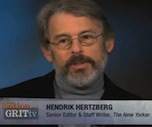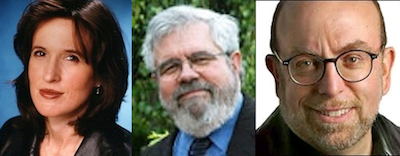
Hendrick Hertzberg
Governor Scott Walker’s attack on the public employee unions of Wisconsin is the most vicious assault on labor since Ronald Reagan broke the air traffic controller’s union in 1981. In an effort to score points with his most extreme right-wing supporters, the governor wants to strip the unions of their 50-year-old right to collective bargaining—“except over base pay, which can never be increased above inflation without a public referendum. It makes union dues purely voluntary and prohibits their collection via paycheck deduction. It requires the unions to face a certification vote every year—and, to get recertified, a union must win a majority of all employees, not just a majority of those voting.”
These facts are all from Winner Rick Hertzberg’s characteristically lucid and authoritative
“Comment” in last week’s New Yorker. In a subsequent online chat, Hertzberg exploded a number of myths about the controversy perpetuated by other reporters much less competent than the dean of American political reporters.
Hertzberg’s New Yorker colleague, Winner Dan Kaufman, also contributed a lovely blog post—“Notes on the Cheddar Revolution”—about how the current the protest was informed by Wisconsin’s (mostly) liberal past.
Sinners Arthur Gregg Sulzberger and Monica Davey attracted plenty of unwanted attention with a seriously sloppy hatchet job on the labor movement which ran on page 1 of The New York Times. Demonstrating once again that journalists can prove almost any premise, if they’re careful to skew their interviews so that at 80 percent of the people you quote agree with you, Sulzberger and Davey tried hard to prove that union bonds were fraying in Wisconsin.
“Workers themselves, being pitted against one another, are finding it hard to feel sympathy or offer solidarity, with their own jobs lost and their benefits and pensions cut back or cut off,” the Times reporters wrote, and “away from Madison” [a notorious left-wing stronghold, of course] “many people said that public workers needed to share in the sacrifice that their own families have been forced to make.”

Katrina vanden Heuvel, David Cay Johnston, Harold Myerson
Just how far the reporters had been forced to been over backwards to make their point quickly became apparent after
1) “Union guy” Richard “Hahan,” who had worked for GM, and was described in the lead of their story as a strong supporter of the governor’s “sweeping proposal to cut the benefits and collective-bargaining rights of public workers in Wisconsin”–turned out to be a lifelong scab, who according to a subsequent correction, had “worked at unionized factories,” but never actually belonged to a union himself (also, his name was really “Hahn,” not “Hahan”).
2) Winners Richard Simon and Abby Sewell reported a couple of days later in The Los Angeles Times that the dispute had actually ignited a profound new solidarity between public sector workers and private sector union members–not only in Wisconsin, but across the country.
3) A new poll conducted by their own newspaper, The New York Times poll released a couple of days ago, showed that most Americans supported public employee unions in their battles against newly elected Republican governors in Wisconsin and Ohio. In what was perhaps the most heartening news of the week, despite the widespread Republican perception that unions are politically useful whipping boys, The Times reported that
* Americans oppose weakening the bargaining rights of public employee unions by a margin of nearly two to one: 60 percent to 33 percent.
* Those surveyed said they opposed, 56 percent to 37 percent, cutting the pay or benefits of public employees to reduce deficits.
* Sixty-one percent of those polled—including just over half of Republicans—said they thought the salaries and benefits of most public employees were either “about right” or “too low” for the work they do.
Winner David Cay Johnston of tax.com accused Sulzberger and Davey of being among the legions of reporters who were reporting “economic nonsense” as “fact”–“the product of a breakdown of skepticism among journalists multiplied by their lack of understanding of basic economic principles.”
Johnston is incensed because he believes that every time a reporter says the Wisconsin governor is asking public employees to increase their contributions to their pensions, they are repeating an outright lie. Here’s why:
Out of every dollar that funds Wisconsin’ s pension and health insurance plans for state workers, 100 cents comes from the state workers.
How can that be? Because the “contributions” consist of money that employees chose to take as deferred wages – as pensions when they retire – rather than take immediately in cash. The same is true with the health care plan. If this were not so a serious crime would be taking place, the gift of public funds rather than payment for services.
Thus, state workers are not being asked to simply “contribute more” to Wisconsin’ s retirement system (or as the argument goes, “pay their fair share” of retirement costs as do employees in Wisconsin’ s private sector who still have pensions and health insurance). They are being asked to accept a cut in their salaries so that the state of Wisconsin can use the money to fill the hole left by tax cuts and reduced audits of corporations in Wisconsin.
(Sulzberger and Davey wrote that the Governor “would raise the amount government workers pay into their pension to 5.8 percent of their pay, from less than 1 percent now.” Sulzberger is the son of the current Times publisher, Arthur O. Sulzberger Jr., who is perpetually at odds with the unions at the Times, the Boston Globe, and the rest of his newspaper properties, so it’s unlikely that the son grew up in a household where people like former U.A.W. president Walter Reuther were portrayed as revered figures by his parents.)
On the other hand, the Sulzbergers are the last newspaper family in America that still employs a fulltime labor reporter…
Winner Steve Greenhouse, whose reporting on Wisconsin has been characteristically fair and thororough–from a feature about the pizza parlor which delivered hundreds of pies a day to fuel protesters inside the Wisconsin state capitol building to a profile of Marty Bell, the executive director of the Wisconsin State Employees Union, whose bare-knuckled styled helped to “transform Madison into a national battle ground over labor rights.”
Winner: Katrina vanden Heuvel gets to the heart of the matter in The Washington Post: “unions…have been central to the rise and fall of the American middle class. There is a strong corrleation between states with right-to-work laws that outlaw majority rule onunionization, a worse quality of life for workers and a more hostile climate to any progressive cause. The average worker in a right-to-work state earns $5,333 less than his or her counterpart in a pro-worker state.”
Winner: Madison’s venerable Capitol Times, now online only, has been a reliable source of hard hitting editorials like this one, and articles explaining exactly what is at stake for the Koch brothers, like this one.
Sinner USA Today gave big play to a piece comparing public and private sector wages and benefits, without adjusting for specific jobs, age, education or experience–which basically rendered all of the comparisons in the piece completely meaningless. (Surprise! College professors and nurses make more than burger flippers at McDonald’s) while the Economic Policy institute showed how these comparisons should actually be done.
(h/t GK.)
Winner: Columnist Harold Meyerson, whose extensive coverage included this eye opening column about the GOP’s much broader efforts to undermine unions everywhere, way beyond Ohio and Wisconsin.
-30-



